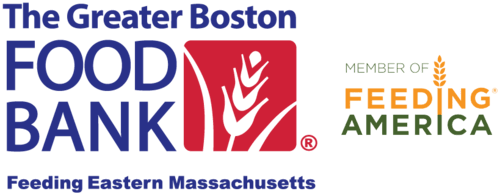Reflection on Pride Month
During Pride month, we honor the 1969 Stonewall Uprising in Manhattan, a turning point for the modern gay rights movement, and celebrate the promotion of self-affirmation, dignity, equality, and increased visibility of lesbian, gay, bisexual, transgender, queer, and additional sexual orientation and gender identities (LGBTQ+). Massachusetts has the second largest LGBTQ+ population of any state, making it home to a significant proportion of the LGBTQ+ community. While much progress has been made toward achieving justice and equal opportunities for LGBTQ+ communities in the Commonwealth and nationally, significant social, economic, and political barriers remain.
For example, in GBFB’s recent “Opportunities to Improve Food Equity and Access in Massachusetts” report, 51 % of LGBTQ+ adults in Massachusetts experienced food insecurity at some point during 2021. While shocking, this unfortunately does not come as a surprise.
Prior to the pandemic in 2018, The Equality Fund at The Boston Foundation’s “Equity and Equality: Advancing the LGBTQ+ Community in Massachusetts” report demonstrated that 32.7 % of LGBTQ+ youth of color in Greater Boston are unemployed, and 15.5 percent unstably housed. In 2017, 65 percent of Massachusetts’ transgender people report experiencing discrimination in public spaces in the past year. Additionally, almost one-third of LGBTQ+ adults aged 50 to 75 have been diagnosed with depression at some point in their lives. Nationally, LGBTQ+ youth who reported past housing instability or current homelessness had more than three times greater odds of reporting food insecurity in the last month than those who did not experience housing instability, according to the Trevor Project’s 2021 Homelessness and Housing Instability Among LGBTQ Youth report.
Mental health, discrimination, housing instability, and employment opportunities are all factors that contribute to food insecurity and have disproportionately impacted Latinx, Black, and LGBTQ+ folks and families with children, especially during the pandemic. The University of California Los Angeles (UCLA) School of Law’s Williams Institute’s 2022 report estimated that 13% of LGBTQ+ adults in the U.S. reported not having enough to eat in the past week, compared to 8% of non-LGBT adults, U.S. Census Bureau data from 2021 shows us that 36.6% of LGBTQ+ adults lived in a household that had difficulty paying for usual household expenses in the previous seven days, compared to 26.1% of non-LGBTQ+ adults. At the state level, The Greater Boston Food Bank’s Opportunities to Improve Food Equity & Access in Massachusetts report released last week found that a staggering 51% of LGBTQ+ adults reported food insecurity in 2021.
As we grapple with these concerning statistics, we must advocate for changes to improve access and eliminate discrimination for LGBTQ+ groups. Last month, under the leadership of the Biden-Harris Administration, the U.S Department of Agriculture’s (USDA) Food and Nutrition Service (FNS) announced that it will eliminate discrimination based on sexual orientation and gender identity in the Supplemental Nutrition Assistance Program (SNAP). This action supports President Biden’s Executive Order on Preventing and Combatting Discrimination on the Basis of Gender Identity or Sexual Orientation, and demonstrates USDA’s commitment to dismantling barriers that historically underserved communities have faced in accessing its programs and services and advancing equity and access in its food and nutrition programming.
GBFB applauds the Administration’s amendment to increase accessibility of the USDA and FNS’s programs and promote food and nutrition security, regardless of sexual orientation and gender identity. GBFB is committed to strengthening relationships between local food pantries and LGBTQ+ organizations to create safer environments for all people in need of food assistance.
“Whether you are grocery shopping, standing in line at the school cafeteria, or picking up food from a food bank, you should be able to do so without fear of discrimination,” said Food, Nutrition, and Consumer Services Deputy Under Secretary Stacy Dean. “No one should be denied access to nutritious food simply because of who they are or how they identify.”
During this Pride Month, let’s celebrate how far our LGBTQ+ community has come but also recommit to our efforts to advance equity and access to food for all.
